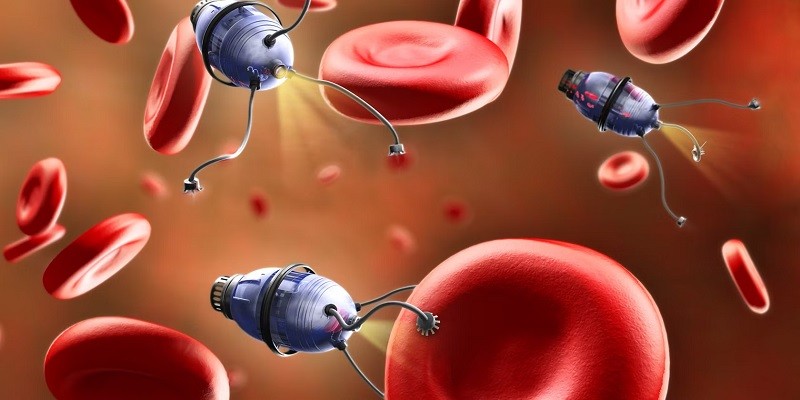Nanotechnology: Small Scale, Big Impact
Nanotechnology has a big impact despite its small scale of operation and applications. We will explore the far-reaching implications of nanotechnology and how it is revolutionizing various industries.
Nanotechnology: Small Scale, Big Impact Nanotechnology, with its microscopic scale of operation, is making a significant impact across different fields. This revolutionary technology deals with structures and processes at the nanoscale level, which is about one billionth of a meter. By manipulating matter at such an intricate level, nanotechnology opens up endless possibilities for innovation and improvement.
One of the key advantages of nanotechnology is its ability to enhance the properties of materials and devices, leading to improved performance and efficiency. For example, in the electronics and computing industry, nanoscale transistors can be produced to increase processing speed and reduce power consumption. Similarly, in the medical field, nanoscale drug delivery systems can target specific cells, leading to more effective and personalized treatments. Nanotechnology also plays a vital role in energy production and conservation. By developing nanomaterials with superior conductive properties, more efficient solar panels and energy storage devices can be created, contributing to a sustainable future. Furthermore, nanotechnology is a catalyst for the development of novel and advanced materials.
By manipulating matter at the nanoscale, researchers can create materials with unprecedented properties, such as enhanced strength, flexibility, and conductivity. Overall, nanotechnology has the potential to revolutionize numerous industries and improve our daily lives. Through its small-scale operations, it holds the key to big impacts in fields ranging from electronics to medicine and energy to materials engineering. As researchers continue to explore the capabilities of nanotechnology, it is expected to bring about remarkable advancements that will shape the future.
The Basics Of Nanotechnology

Introduction To Nanotechnology
Nanotechnology involves manipulating matter at the nanoscale.
At this scale, materials behave differently than their larger counterparts.
Engineers and scientists use nanotechnology for various applications.
Properties Of Nanomaterials
- Nanomaterials exhibit unique chemical and physical properties.
- Properties such as strength, conductivity, and reactivity are enhanced.
- The surface area-to-volume ratio increases significantly.
- Nanomaterials find applications in medicine, electronics, and more.
Applications Of Nanotechnology
When it comes to nanotechnology, its applications across various fields can be truly mind-boggling. From healthcare to electronics to environmental remediation, the impact of nanotechnology is impressive and far-reaching. Let’s explore some of the groundbreaking applications of nanotechnology in these areas.
Healthcare
In the field of healthcare, nanotechnology has opened up new doors for diagnostics, treatment, and drug delivery. Nanoscale devices and sensors can be used to detect diseases at an early stage, allowing for timely intervention. Nanoparticles loaded with drugs can target specific cells or tissues, maximizing therapeutic efficiency while minimizing side effects. Furthermore, nanotechnology enables precise surgical techniques using nano-sized tools, revolutionizing the medical field.
Electronics
The electronics industry has greatly benefited from advancements in nanotechnology. Miniaturization has been the key driving force, with nano-sized components being used to enhance the capabilities of devices. Nanoelectronics has made it possible to create faster and more efficient computer chips, leading to the development of smaller and more powerful electronic devices. Additionally, nanotechnology has paved the way for flexible and transparent electronics, opening up possibilities for wearable technology and flexible displays.
Environmental Remediation
In the realm of environmental remediation, nanotechnology offers innovative solutions to tackle pollution and contamination. Nanomaterials can be utilized to remove toxic substances from water and soil, providing an effective means of cleaning up polluted environments. Nanoparticles can also be employed to capture and neutralize harmful pollutants in the air, improving air quality. These nanotechnology-based remediation methods have the potential to mitigate the impact of pollution and contribute to a healthier planet.
Nanotechnology In The Future
The future of nanotechnology holds great promise as this emerging field continues to grow and develop. Scientists and researchers are constantly exploring the potential applications and advancements that could revolutionize various industries. Whether it’s in healthcare, energy, or electronics, nanotechnology has the potential to make significant contributions.
Potential Advancements
With nanotechnology, the possibilities for advancements are endless. Here are some potential areas where nanotechnology could have a significant impact:
- Medicine: Nanoparticles can be designed to target specific cells, delivering drugs directly to affected areas and potentially reducing side effects.
- Energy: Nanomaterials could make solar panels more efficient, revolutionizing renewable energy and reducing our dependence on fossil fuels.
- Electronics: As electronic devices continue to shrink in size, nanotechnology can provide the means for creating smaller, faster, and more powerful devices.
- Environment: Nano-sized sensors can be utilized to monitor air and water quality, helping to detect pollution and improve environmental conservation efforts.
Challenges And Ethical Considerations
While the potential advancements of nanotechnology are promising, there are also challenges and ethical considerations that should be addressed:
- Safety: The health and safety implications of nanoparticles are still not completely understood, requiring further research and rigorous testing before widespread deployment.
- Environmental Impact: The disposal of nanomaterials and the potential release of nanoparticles into the environment could have unintended consequences and must be carefully managed.
- Ethical Boundaries: As nanotechnology advances, ethical considerations surrounding its use need to be carefully examined, such as ensuring privacy, preventing misuse, and addressing potential inequalities.
- Regulations: As the field continues to evolve, regulations need to be put in place to ensure the responsible development and deployment of nanotechnology.
Implications Of Nanotechnology
Nanotechnology, at a minuscule scale, has far-reaching impacts that extend across various aspects of our society and economy. Let’s delve into how this technology is poised to revolutionize the world as we know it.
Social Impact
- Nanotechnology enhances medical treatments.
- Improves water filtration systems in developing countries.
- Can lead to safer and more efficient energy sources.
Economic Impact
- Opens up new avenues for job creation.
- Fosters innovation and boosts economic growth.
- Reduces production costs in various industries.
| Aspect | Impact |
|---|---|
| Social | Improved healthcare access |
| Economic | Increased productivity and competitiveness |
Frequently Asked Questions
What Are The Potential Applications Of Nanotechnology?
Nanotechnology has various potential applications in fields such as medicine, electronics, energy, and environmental remediation.
How Is Nanotechnology Being Used In Healthcare?
Nanotechnology is revolutionizing healthcare through advancements in drug delivery, diagnostics, imaging, and regenerative medicine.
What Are The Environmental Impacts Of Nanotechnology?
Nanotechnology offers solutions for environmental cleanup, pollution control, and efficient energy utilization, contributing to a sustainable future.
Can Nanotechnology Improve The Performance Of Electronic Devices?
Yes, nanotechnology enables the development of smaller, more powerful electronic components with enhanced performance and energy efficiency.
How Does Nanotechnology Contribute To Material Science?
Nanotechnology enhances material properties, leading to the development of stronger, lighter, and more durable materials for various industries.
Conclusion
In a nutshell, nanotechnology holds immense potential in shaping future innovations. Its applications span across various industries, revolutionizing healthcare, electronics, and environmental sustainability. The ability to manipulate matter at such a small scale is paving the way for groundbreaking advancements.
Embracing this technology promises a brighter and more efficient future.

